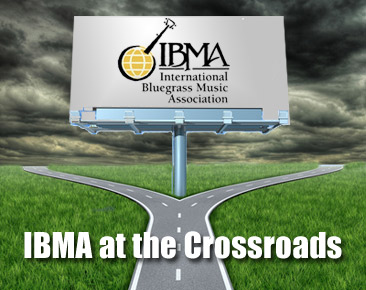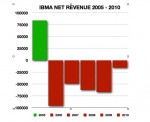
Editor’s Note: This is the first in a series of occasional articles about the future of IBMA. This story contains many more numbers than the one-four-five usually associated with bluegrass, and a more serious approach than we usually take at Bluegrass Today. But the issues addressed here affect the future of the music we all love, so they require such an approach. We invite your comments.
 This is a critical year for the International Bluegrass Music Association, and how its 19-member board responds to challenges on multiple fronts will determine whether the organization rebounds and thrives or withers and eventually dies.
This is a critical year for the International Bluegrass Music Association, and how its 19-member board responds to challenges on multiple fronts will determine whether the organization rebounds and thrives or withers and eventually dies.
The gravity of the situation cannot be overstated. IBMA is hemorrhaging money at a rate that cannot be sustained for very long. From the start of 2006 until the end of 2010 – the most recent year for which public records are available from the Internal Revenue Service – IBMA’s assets and fund balances have fallen by more than 50%.
At the same time, membership in the organization is shrinking and – like the demographic for bluegrass music itself – aging. Attendance at its signature event, the annual World of Bluegrass conference in Nashville, is off, too.
As the board struggles to right IBMA’s financial ship, it is also in the midst of hiring a new executive director, awaiting the results of a first-ever comprehensive audit and trying to launch a new social networking site, Bluegrass Nation. Another looming issue before the board: Whether to keep World of Bluegrass and Fan Fest in Nashville or move it elsewhere.
Each of those decisions will impact IBMA’s future.
“We’re a graying population, and if we don’t somehow attract some younger members, we’re going to die of attrition,” IBMA Board Chairman Stan Zdonik acknowledged in an interview with Bluegrass Today. “But we have to do it without alienating the existing base. The music has to grow, and with it the organization will grow, too, I hope.”
The first decision is to hire an executive director to replace Dan Hays, who is leaving at the end of the month for another job. Like anyone in such as position, Hays made some enemies over the years. But he has many loyal backers, too, and is unquestionably an advocate for bluegrass.
Still, his decision to take another job provides an opportunity for IBMA to rebound and refocus, especially if the new director has other experience in the non-profit world’s key disciplines of finance and fund-raising.
The search “is going a little slower than I had hoped,” Zdonik said. The goal was to have someone on board by now to have a couple of weeks of overlapping with Hayes. But the executive committee just finished interviewing candidates last week. Zdonik said it’s possible for the next director to start in a week or two, but that timetable seems overly ambitious if the board’s choice is currently employed and has to give notice.
 To be sure, IBMA is not the only arts organization – or business of any kind – to suffer during the deep recession. But the group’s financial records show the decline started well before the broader downturn began across the country.
To be sure, IBMA is not the only arts organization – or business of any kind – to suffer during the deep recession. But the group’s financial records show the decline started well before the broader downturn began across the country.
According to IBMA’s financial filings with the IRS, the organization’s equity fell from $608,000 at the start of 2006 to $274,042 at the end of 2010. (IBMA’s filing for 2011 is not yet available from the IRS.)
The organization finished in the red during each of those years, but was able to stay afloat by tapping into what had been a relatively healthy nest egg. And while a bottom line on your balance sheet of nearly $300,000 may seem huge compared to a typical household’s finances, consider this:
The losses over the five years from 2006 through 2010 add up to $291,140. Another five-year run like that and the checkbook would be depleted.
Without a policy change and the generosity of one person, IBMA’s money woes would be even deeper. Until 2008, IBMA donated the after-expenses proceeds of Fan Fest to the IBMA Trust Fund. Bands played for free, with the knowledge that they were allowing the trust fund to help down-on-their-luck pickers who faced big medical bills or other financial trouble.
But since 2008, the board has directed half of Fan Fest proceeds to the trust fund and half – about $88,000 total for 2008-2010 – to IBMA’s treasury.
Editor’s note (2/14): To clarify… We were only able to obtain IRS documents for 2006-2010, and according to these financial reports, all net proceeds for 2006 and 2007 were donated to the Trust Fund. What was donated in prior years can not be verified without further documentation, but IRS forms do show that during 2008-2010, half of the net amount was donated.
We will publish a follow-up report on Trust Fund finances and contributions in the near future.
And while the 2010 loss of $15,904 looks good on paper compared with earlier losses, that number was buoyed by a $37,889 gift from L. M. Palmer of California.
Such gifts can’t be counted on with any kind of regularity, in part because, as Zdonik notes, they aren’t tax deductible, and in part because IBMA doesn’t aggressively pursue them. Aside from the Palmer gift, the organization reported just $3,185 in “contributions, gifts and grants” in 2010, $2,000 in 2009 and $40 in 2008. Zdonik said those numbers do not include some sizable corporate sponsorships. There is no breakdown of the value of those sponsorships on the financial reports filed with the federal government.
Following the money over the five-year period shows a steady decline in revenues not only in general but for World of Bluegrass, too. IBMA has limited the damage by cutting expenses, but the red ink continues to flow.
continued…







